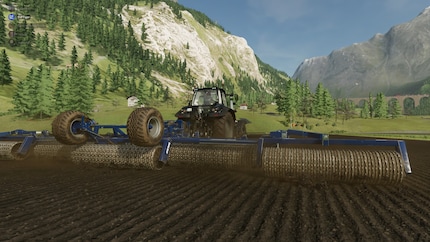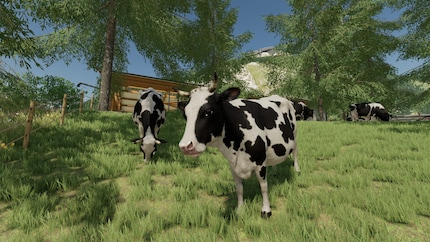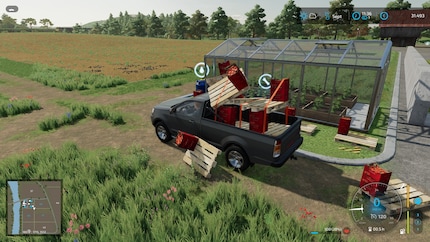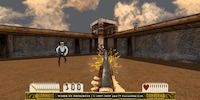
Review
FS25 is clogging up my tyres with dirt – and I love it
by Debora Pape

A new study has given the popular "Farming Simulator" a dubious report card: The game promotes problematic ideals and could influence gamers' behaviour in real life.
Ordering virtual fields and breeding digital cattle is very popular. The «farming simulator» (LS) from Swiss studio Giants Software is one of the most successful farming simulations in the world. More than 40 million copies of the games in the series have been sold since the first instalment saw the light of day in 2008. Reason enough for the two researchers Simon Foureaux and Thomas Daum from the University of Gothenburg to take a scientific look at the influence of games on reality.
In their study, the two examine how «LS 22» - the predecessor of the current title «LS 25» - shapes the ideas of «good farming».
They analysed the opening video, the gameplay and the visual elements of the game. Their result: The «LS 22» reinforces an «good Farming» ideal driven by economic interests, which is based on high income and the acquisition of modern machines, while ecological aspects are neglected. Here you can see the intro video of «LS 22», which serves all the values of «good Farming».
Before you say it yourself: Yes, the «LS» is just a game and should be fun. You can also leave the church in the village. However, with a simulation heavyweight like the «LS», a closer look is also legitimate. The authors argue that the «Farming Simulator» bears a certain responsibility due to its popularity and the appearance of reflecting reality. You can read more about this below.
According to the authors of the study, the traditional image of agriculture - both in society and in the self-confidence of the farmer - cannot be reconciled with long-term sustainable farming from an ecological perspective.
Large, clean fields with the largest possible, uniform crops that are produced using pesticides and large quantities of fertiliser destroy habitats and contribute to the reduction of biodiversity. According to the study, the use of large agricultural machinery and the image of the «tough farmer» reinforce the effects of this form of farming. However, this has a negative impact on future yields and ecology in the overall context and does not meet the requirements of climate change either.
Among the agricultural approaches that counteract these harmful aspects, the two researchers cite polycultures and set-aside measures such as the creation of hedges, flower strips and ponds. This leads to smaller and «messy» looking areas of land as well as yield losses - which contradicts the traditional image of agriculture. Farmers who implement such measures can even lose reputation within their community.
It is therefore problematic to continue to communicate the traditional «good agriculture», the researchers write.
In the game, you work your way up from a small farmer to a large agricultural landowner. By buying bigger and better machines, you work your fields more efficiently so that you can buy more machines and bigger fields to earn even more money. To maximise your earnings, just make sure you do the right work at the right time - such as ploughing, sowing, fertilising and spraying pesticides. That's all you need to do. Just a typical simulator.

Animal husbandry is also greatly simplified. You don't have to worry about diseases, animal welfare and unpleasant aspects such as slaughter. In the game, your animals are always doing well.
The problem with this is that «LS» is playing at wanting to represent a realistic approach. The researchers therefore criticise the opening sequence, which shows all aspects of traditional «good farming». «Don't think this [working as a farmer] is a game», says the narrator, among other things.

Vehicles in the game need to be refuelled and repaired. Stones accumulate in the fields, which you have to remove to improve yields and prevent damage to the working equipment. According to the two researchers, the more than 100 licensed real-world brands in the game - from agricultural machinery and implements to clothing - also give the impression of a high degree of realism.
Although the «LS»is a game, the simulation also has an educational effect. This is enhanced by the detailed design of tools and machines.
I myself have a few hours of «LS 22» under my belt and previously had no idea about farming at all. Thanks to «LS», I can now recognise a seed drill or a feed mixer wagon when I see one. And I can tell roughly what the driver is doing in the field. Thanks to the age rating of 0, «LS» is also suitable for very young players. My nine-year-old nephew loves the game - that's the only reason he already knows a lot about (oversimplified) farming.
The authors of the study address precisely this aspect: «Serious games» such as LS have great educational potential. Users internalise the knowledge learned in the game and are shaped by it. Inaccurate content can therefore convey a false image that could influence people when making decisions in everyday life - for example in the supermarket or even at the ballot box.
According to the study, Giants Software estimates that around 25 per cent of gamers have a real connection to agriculture and ten per cent are farmers themselves. This means that reinforcing the potentially harmful ideal image of agriculture can have an impact on reality and, in case of doubt, prevent farmers from using more sustainable methods.

Although the authors attest to the strong deficits of «LS», they emphasise the game's potential. After all, mods can significantly increase the game's level of realism.
They particularly emphasise the free mod «Precision Farming». This mod is being developed by various European universities and funded by the EU. It brings sustainable aspects into play - with the aim of raising awareness among the population. For example, it rewards you for not over-fertilising your fields. I've always enjoyed using it because it makes the game more complex - and also more realistic. «Precision Farming» has been around since 2020 and first appeared for «LS 19». It has also been available for the current «LS 25» since May.
Through approaches like this mod, the «Farming Simulator» could change the old image of «good agriculture» towards more sustainability in the medium term, the researchers conclude.
Feels just as comfortable in front of a gaming PC as she does in a hammock in the garden. Likes the Roman Empire, container ships and science fiction books. Focuses mostly on unearthing news stories about IT and smart products.
Interesting facts about products, behind-the-scenes looks at manufacturers and deep-dives on interesting people.
Show all
Background information
by Debora Pape

Background information
by Philipp Rüegg

Background information
by Kevin Hofer